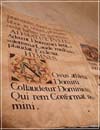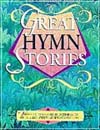

|
|


|
 |

The Solid Rock
Colossians 1:27
SOLID ROCK | Hymn History | Bible Passage
|
Author: |  |
Edward Mote, 1797-1874 |
|
Musician: | |
William B. Bradbury, 1816-1868 |
 |  Play MP3 • Click to listen to the music for this hymn. Play MP3 • Click to listen to the music for this hymn.
|
My hope is built on nothing less
Than Jesus' blood and righteousness;
I dare not trust the sweetest frame,
But wholly lean on Jesus' name.
Refrain:
On Christ, the solid Rock, I stand;
All other ground is sinking sand,
All other ground is sinking sand.
When darkness veils His lovely face,
I rest on His unchanging grace;
In ev'ry high and stormy gale,
My anchor holds within the veil.
His oath, His covenant, His blood,
Support me in the 'whelming flood;
When all around my soul gives way,
He then is all my hope and stay.
|


|
 |
HYMN HISTORY:
It's many years now since I first heard a preacher recite the rather unusual couplet:
On Christ the solid rock I stand;
All other rocks - are shamrocks!
He was quoting, of course, from a parody on the chorus of the hymn "On Christ The Solid Rock I Stand."
What a fine hymn that is, Bishop Bickersteth, himself an outstanding hymnist, called it 'a grand hymn of faith'. There's no doubt that his assessment is right.
"The Solid Rock," to give the hymn its proper title, was written in 1834 and first appeared, anonymously, in leaflets and newspapers. Very quickly, considerable debate arose as to the identity of the author, and so the man responsible, Mr. Edward Mote, decided to acknowledge his workmanship.
Explaining how the idea for the hymn came - on his way to work - Mote said, 'I began to meditate on the gracious experience of the Christian, soon the chorus, and then the words of the first verse, came to mind.'
The following Sunday, coming out of morning worship, he was invited to a friend's home to encourage his wife who was critically ill. He went to the home in the early evening, and after spending some time comforting the dying woman was asked to join in family worship.
It was the custom in the house to sing a hymn, read the scripture, and then pray. As the man of the house searched in vain for a hymn book, Edward Mote said, 'I have some verses in my pocket. If you like we can sing them,' and they did.
The new words struck a responsive chord in the heart of the sick woman and, as a consequence, her husband requested a copy for her.
'Back at home,' continues the author, 'I sat by the fireside, musing on the sick lady's reaction to the words I had written; and soon the entire hymn was clear in my mind.'
This new, enlarged version was committed to paper and a copy made for the dying friend. Later, he decided that, since the hymn had been such a blessing and comfort to this woman in her last hours, maybe it would be of help to others as well.
Edward Mote was born in London on January 21st 1797. His background appeared to be far from Christian. As a boy he had no interest in the things of God. In fact, so ignorant was he of spiritual matters that he didn't even know there was a God.
His parents were of no help to him either. They kept a public house and sent their son to a school where the Bible was neither taught nor permitted. On Sundays, instead of attending church, he and his friends spent their time playing in the streets. Such was his irreligious, unsheltered upbringing.
However, for some reason which is not known, Edward began attending church when he became apprenticed to a cabinet maker. Around about this time he went to hear the famous preacher, Rev. John Hyatt at Tottenham Court Road Chapel. Mote records that the sermon made him 'think on his way', and two years later he came into the experience of salvation.
Eventually, he felt called to preach the gospel which he now so passionately believed; and was instrumental in the building of at least one church. It is evident that he exercised a faithful ministry there for, when he died, the congregation erected a plaque which included in the inscription these words:
For 26 years the beloved pastor of this church, preaching Christ and Him crucified, as all the sinner can need, and all the saint can desire.
Assurance and security were Edward Mote's constant companions throughout his long life. Even when his health began to fail and he was approaching death he felt a renewed confidence in the merit of the blood of Christ.
Just before he died, in 1874, he said, 'I think I am nearing Port. But the truths I have preached I am living upon, and they will do to die upon, Ah! the precious blood! The precious blood which takes away all my sins; it is this which makes peace with God.'
And thus Edward Mote, preacher and hymn-writer said farewell to this earth ...
Dressed in His righteousness alone,
Faultless to stand before the throne!
On Christ, the solid rock I stand
All other ground is sinking sand.
The first verse and chorus of the hymn is ...
My hope is built on nothing less
Than Jesus' blood and righteousness
I dare not trust the sweetest frame,
But wholly lean on Jesus' Name.
On Christ the solid Rock, I stand;
All other ground is sinking sand.
BIBLE PASSAGE:
27 To whom God would make known what is the riches of the glory of this mystery among the Gentiles; which is Christ in you, the hope of glory:
|
|
|

|

|